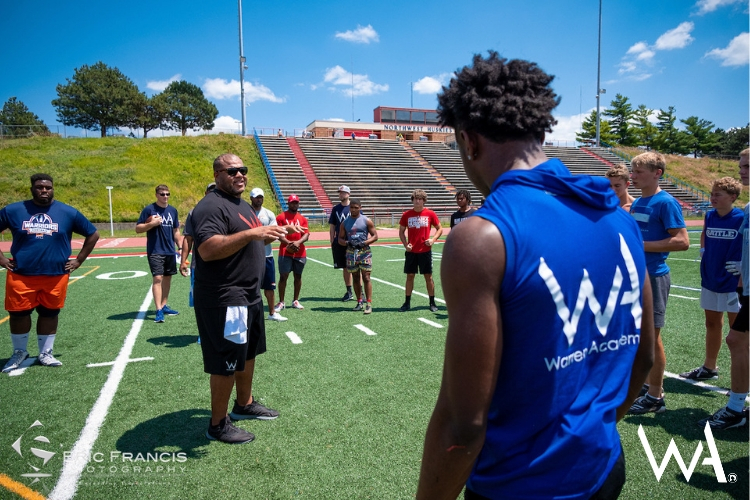
Tips on balancing sports and school
Other Blogs
-
10/22/2025 10:11 PM
Empowering Female Athletes. Youth Basketball & Soccer Performance in Omaha
-
10/22/2025 9:57 PM
High School Football Playoffs: Mental Preparation Tips | Warren Academy Omaha
-
10/30/2024 1:58 PM
Breaking Down Plyometric Training: How to Build Explosive Power for Football
-
10/23/2024 12:00 PM
Offseason Training: Why Speed And Agility Matters
-
10/16/2024 12:05 PM
Functional Strength: Why Athletes Need More Than Just Lifting Weights
-
10/9/2024 12:07 PM
The Role of Flexibility in Sports: Why It’s Key to Preventing Injuries
-
10/2/2024 12:09 PM
Preventing Burnout In High School Athletes
-
9/11/2024 1:34 PM
Injury Prevention 101: Keeping Football Athletes Safe and Healthy During the Season
-
8/28/2024 2:35 PM
Stability Training: What It Is & Why It’s Beneficial
-
8/14/2024 12:16 PM
Injury Prevention Strategies for High School Football Players
-
8/7/2024 10:15 AM
In-Season Recovery Tips
-
7/31/2024 12:10 PM
Why In-Season Strength Training Is Crucial For Football Athletes
-
7/24/2024 1:24 PM
Developing Leadership Skills: Becoming a Leader On and Off the Field
-
7/17/2024 12:37 PM
Athlete Qualities That Make You GREAT
-
7/10/2024 12:03 PM
Benefits Of Playing Multiple Sports In High School
-
7/3/2024 11:51 AM
Fuel Your Body: Essential Tips For Athletes
-
6/19/2024 9:33 AM
Tips on building confidence on and off the field
-
6/12/2024 10:09 AM
Mobility vs Flexibility
-
6/5/2024 3:15 PM
Summer Training Essentials
-
5/29/2024 4:20 PM
Position-Specific Training: Tailoring Workouts for Football Players
-
5/22/2024 12:55 PM
Staying Motivated During Offseason Training
-
5/15/2024 1:52 PM
Functional Movement Training: Improving Mobility and Stability for Athletic Performance
-
5/1/2024 9:45 AM
Summer Training Essentials: Staying Active and Improving Skills During the Offseason
-
4/24/2024 1:05 PM
Preventing Injuries: Conditioning and Injury Prevention Drills for Running Backs
-
4/10/2024 12:34 PM
Acceleration vs Speed: Why athletes need both
-
4/3/2024 12:34 PM
The role of carbohydrates in post-workout recovery
-
3/27/2024 1:41 PM
Mental Toughness Training: Building Resilience In Young Athletes
-
3/20/2024 9:03 AM
Why Strength Training is Vital For Athlete Development
-
3/13/2024 7:52 AM
Offseason Injury Prevention: Ways To Keep Your Body Safe
-
2/28/2024 12:30 PM
Speed Development Strategies: Enhancing Athletic Performance for Football Players
-
2/28/2024 9:11 AM
Defensive Technique: Training Tips For D-Line, LBs and DBs
-
2/21/2024 12:45 PM
Maximizing Offseason Gains: A Guide for High School Football Players
-
2/14/2024 2:39 PM
Speed and Strength: The Cornerstone for Football Athletes
-
2/7/2024 12:17 PM
The Warren Academy Game Changer Program
-
1/24/2024 9:05 AM
Private Position Training At Warren Academy
-
1/17/2024 4:05 PM
Welcome To Our New Website!
-
2/1/2023 1:49 PM
Benefits of training as a team
-
1/25/2023 11:13 PM
Why Athletes Need Strength Training
-
1/18/2023 12:16 PM
Offseason Football Training Overview
-
1/11/2023 10:22 AM
Unsigned Senior & Top Prospects Showcases
-
1/4/2023 12:16 PM
Athlete New Year’s Goals
-
12/21/2022 11:33 AM
Stay Motivated This Offseason
-
12/14/2022 10:42 AM
College Showcase Tips
-
12/7/2022 11:54 AM
The Benefits Of Speed And Agility Training For Young Athletes
-
11/30/2022 12:23 PM
Importance Of A Strong Core
-
11/17/2022 3:15 PM
Advantages Of Playing Multiple Sports
-
11/11/2022 1:30 PM
Setting Athlete Goals
-
11/3/2022 2:59 PM
Start Your Offseason Off Stong
-
10/26/2022 12:40 PM
Qualities All Great Athletes Encompass
-
10/19/2022 11:23 AM
How Young Athletes Can Deal With Failure
-
10/5/2022 1:42 PM
Athlete Recovery Tips
-
9/21/2022 1:18 PM
Ways Athletes Can Stay Confident In Themselves
-
8/25/2022 8:26 AM
The Importance Of Athlete Stretching
-
8/18/2022 11:43 AM
How To Be The Best Teammate
-
8/3/2022 11:52 AM
Managing Sports and School
-
7/27/2022 11:54 AM
How Athletes Can Make A Great First Impression
-
7/20/2022 12:15 PM
Qualities Of A Leader
-
7/6/2022 12:32 PM
The Benefits Of Being A Multi-Sport Athlete
-
6/29/2022 11:45 AM
Summer Agility Drills
-
6/22/2022 11:18 AM
Staying Motivated During Summer Training
-
6/1/2022 11:39 AM
Nutrition For Faster Injury Recovery
-
5/25/2022 12:16 PM
How Are You Preparing For Your Workouts?
-
5/18/2022 11:45 AM
Summer Training Tips
-
5/4/2022 11:33 AM
Why Core Strength Is Essential For Optimal Performance
-
4/20/2022 12:52 PM
The Benefits of Resistance Training for Athletes
-
4/6/2022 11:25 AM
Best Ways To Build Speed
-
3/23/2022 12:25 PM
Why Sport-Specific Training is Beneficial to Athletes
-
3/9/2022 12:32 PM
How To Tell When Your Are Overtraining
-
2/16/2022 11:50 AM
How To Manage Being A Multi-Sport Athlete
-
2/2/2022 4:12 PM
Athlete Recruiting Tips
-
1/19/2022 11:00 AM
Ways Athletes Can Build Strength
-
1/5/2022 11:24 AM
Ways To Stay Motivated And Focused During The Offseason
-
12/15/2021 11:51 AM
Ways To Improve Acceleration
-
12/1/2021 12:02 PM
UPDATED: Reasons To Play 7v7 During The Offseason
-
11/17/2021 11:19 AM
The Importance Of Attending Football Camps
-
11/3/2021 11:34 AM
How To Tackle Your Offseason
-
10/20/2021 10:58 AM
How Yoga Benefits Athletes
-
10/6/2021 10:34 AM
Recruiting Tips For High School Athletes
-
9/22/2021 2:11 PM
Athlete Tips: Dealing with failure
-
9/8/2021 10:44 AM
Benefits Of In-Season Training
-
8/25/2021 11:25 AM
How To Manage Your Time As A Student Athlete
-
8/11/2021 9:35 AM
How To Impress Coaches Early In The Season
-
7/14/2021 10:45 AM
Tips On Mentally Preparing For A New Season
-
6/30/2021 9:30 AM
Football Summer Agility Drills
-
6/16/2021 10:48 AM
Things Athletes Need In Order To Become Great
-
6/2/2021 10:25 AM
The Importance Of Good Nutrition When Injured
-
5/19/2021 10:48 AM
Tips On Staying Motivated Throughout The Summer
-
5/5/2021 10:59 AM
How Any Athlete Can Become A Great Leader
-
4/21/2021 10:51 AM
How Youth Sports Help Teach Life Skills
-
4/7/2021 10:51 AM
Benefits of Team Training
-
3/10/2021 10:43 AM
Ways To Be A Good Teammate
-
2/24/2021 10:40 AM
Mobility vs. Flexibility: What’s the Difference?
-
2/10/2021 10:35 AM
Benefits of Resistance Training
-
1/27/2021 9:28 AM
How to make yourself stand out at tryouts
-
1/13/2021 10:54 AM
College Recruiting Tips for Athletes
-
12/23/2020 11:03 AM
Benefits of Strength and Conditioning Programs
-
12/9/2020 10:56 AM
How Speed and Agility Training Benefits Athletes
-
11/25/2020 11:38 AM
Why stretching is important for every athlete
-
11/11/2020 10:39 AM
Benefits of Sport-Specific Training
-
10/28/2020 11:01 AM
Off-Season Training Tips
Tips on balancing sports and school
https://www.warrenacademy.com/images/uploads/content/_resized/a6bc3eb9-4883-44cb-9a76-5a580831fb74.jpg
Omaha Media Group https://www.omahamediagroup.com/images/uploads/monster_gallery/Omaha-Media-Group-Black.jpg
OMG Admin
https://www.omahamediagroup.com/images/uploads/monster_gallery/Omaha-Media-Group-Black.jpg
OMG Admin

 https://www.omahamediagroup.com/images/uploads/monster_gallery/Omaha-Media-Group-Black.jpg
OMG Admin
https://www.omahamediagroup.com/images/uploads/monster_gallery/Omaha-Media-Group-Black.jpg
OMG Admin

Summer is finally coming to an end and that means a couple things. First, after all of the training and off-season work you’ve put in, fall sports are here! And with fall sports comes another thing; school.
Being a student athlete can be tough, especially at the beginning of the year. Athletes in school wake up, go to school for 8 hours, attend practice, do their homework, then go to bed. Now that sounds like a busy schedule, which is why balancing school and sports is so important.
Learning how to balance school and sports may take some getting used to. Today we are going to talk about some tips on how to do just that.
1. Manage your time wisely
Being a student athlete means your day-to-day schedule is going to be busy; it’s similar to having a full-time job. In high school, you are at school and practice until about 6 or 7 every day. When you come home you are doing homework, watching film and still trying to get an ample amount of sleep. It is very tough. It’s even harder in college, because you’re away from home and on your own.
Focusing on your time management is probably the best thing you can do as a student athlete. At the beginning of the school year, it may be difficult to get used to things again, especially coming from summer. Planning your days and weeks will help you understand everything that needs to be done and when you are going to do that. Knowing when you’re going to watch film and have practice and lifting will allow you to plan out when you’re going to do your homework and study.
2. Communicate Effectively
Another thing to try and focus on is communicating effectively to your professors. Professors and teachers are there to make sure you’re learning, understanding and having success in your academics. If you are in high school, teachers usually know when you’re going to be absent or have to miss class for a game. In college, however, it’s a different story. It is important to let your professors and teachers know at the beginning of the semester that you are a student athlete, and let them know when you’re going to be missing class.
It is also important to form good relationships with your teachers and professors. They are there to help you. If you need extra help or have any questions, you should be communicating that with your professor.
3. Work with teammates and other athletes
Chances are, you are going to be in the same classes or have the same major as some of your teammates, or even just other athletes at your school. Use this to your advantage when studying for exams or for homework. Asking questions and getting a different perspective on a set topic can help you learn and excel when it comes to school.
Being an athlete in school is a great opportunity, yet school is inevitably what you are there for. You should be putting school first in everything you do, no matter what grade you are in. You work and train hard to be the best athlete you can be, and you should be doing just the same with your academics.







